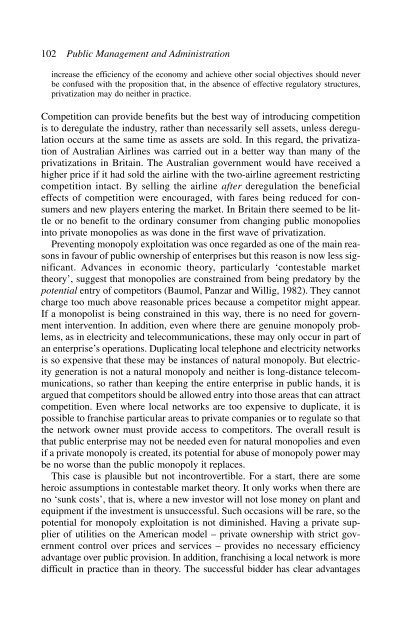Public Management and Administration - Owen E.hughes
Public Management and Administration - Owen E.hughes
Public Management and Administration - Owen E.hughes
You also want an ePaper? Increase the reach of your titles
YUMPU automatically turns print PDFs into web optimized ePapers that Google loves.
102 <strong>Public</strong> <strong>Management</strong> <strong>and</strong> <strong>Administration</strong><br />
increase the efficiency of the economy <strong>and</strong> achieve other social objectives should never<br />
be confused with the proposition that, in the absence of effective regulatory structures,<br />
privatization may do neither in practice.<br />
Competition can provide benefits but the best way of introducing competition<br />
is to deregulate the industry, rather than necessarily sell assets, unless deregulation<br />
occurs at the same time as assets are sold. In this regard, the privatization<br />
of Australian Airlines was carried out in a better way than many of the<br />
privatizations in Britain. The Australian government would have received a<br />
higher price if it had sold the airline with the two-airline agreement restricting<br />
competition intact. By selling the airline after deregulation the beneficial<br />
effects of competition were encouraged, with fares being reduced for consumers<br />
<strong>and</strong> new players entering the market. In Britain there seemed to be little<br />
or no benefit to the ordinary consumer from changing public monopolies<br />
into private monopolies as was done in the first wave of privatization.<br />
Preventing monopoly exploitation was once regarded as one of the main reasons<br />
in favour of public ownership of enterprises but this reason is now less significant.<br />
Advances in economic theory, particularly ‘contestable market<br />
theory’, suggest that monopolies are constrained from being predatory by the<br />
potential entry of competitors (Baumol, Panzar <strong>and</strong> Willig, 1982). They cannot<br />
charge too much above reasonable prices because a competitor might appear.<br />
If a monopolist is being constrained in this way, there is no need for government<br />
intervention. In addition, even where there are genuine monopoly problems,<br />
as in electricity <strong>and</strong> telecommunications, these may only occur in part of<br />
an enterprise’s operations. Duplicating local telephone <strong>and</strong> electricity networks<br />
is so expensive that these may be instances of natural monopoly. But electricity<br />
generation is not a natural monopoly <strong>and</strong> neither is long-distance telecommunications,<br />
so rather than keeping the entire enterprise in public h<strong>and</strong>s, it is<br />
argued that competitors should be allowed entry into those areas that can attract<br />
competition. Even where local networks are too expensive to duplicate, it is<br />
possible to franchise particular areas to private companies or to regulate so that<br />
the network owner must provide access to competitors. The overall result is<br />
that public enterprise may not be needed even for natural monopolies <strong>and</strong> even<br />
if a private monopoly is created, its potential for abuse of monopoly power may<br />
be no worse than the public monopoly it replaces.<br />
This case is plausible but not incontrovertible. For a start, there are some<br />
heroic assumptions in contestable market theory. It only works when there are<br />
no ‘sunk costs’, that is, where a new investor will not lose money on plant <strong>and</strong><br />
equipment if the investment is unsuccessful. Such occasions will be rare, so the<br />
potential for monopoly exploitation is not diminished. Having a private supplier<br />
of utilities on the American model – private ownership with strict government<br />
control over prices <strong>and</strong> services – provides no necessary efficiency<br />
advantage over public provision. In addition, franchising a local network is more<br />
difficult in practice than in theory. The successful bidder has clear advantages











